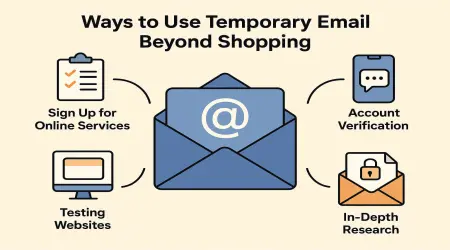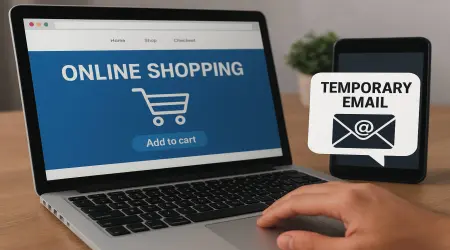

What Is a Temporary Email? Your Complete Guide for 2025
In an age where privacy breaches dominate the headlines and spam floods our inboxes, protecting your personal email address is more important than ever. Enter the world of temporary email addresses—a simple, powerful solution that gives users control, privacy, and peace of mind. But what exactly is a temporary email, and why is it a must-have tool in 2025?
What Is a Temporary Email?
A temporary email—also known as a disposable, burner, or throwaway email—is a short-lived email address used for receiving messages for a limited period. Unlike your permanent Gmail or Outlook account, temporary emails are designed to exist only for minutes or hours, often without requiring sign-up or personal data.
These email addresses can:
Receive verification codes, login links, and one-time offers
Expire automatically to prevent spam accumulation
Operate anonymously, protecting your real identity
✅ According to EFF, disposable emails are one of the easiest ways to protect your digital footprint and block online trackers.
How Does a Temporary Email Work?
Temporary email services generate a random address instantly. When a website asks for your email, you can paste this temporary address instead of your personal one.
How It Works in 3 Simple Steps:
Visit a temp mail provider (like TemporaryMail.info)
Copy the auto-generated address
Paste it into any site that requires email verification
The inbox is often displayed on the same page, where you can view incoming messages in real-time—no password, no setup, no problem.
Why Use Temporary Emails in 2025?
Privacy isn’t a luxury anymore—it’s a necessity. From data brokers to email harvesters, your inbox is constantly under threat. Here’s why temp emails matter more than ever:
🔒 1. Stop Spam Before It Starts
Avoid newsletters, promotional ads, and phishing attempts that typically follow a form submission.
👁️ 2. Browse and Register Anonymously
Sign up for services, trials, or apps without revealing your identity.
⚙️ 3. Test Websites and Apps Safely
Developers and QA testers rely on temporary email to test login flows and email systems without cluttering real inboxes.
🛡️ 4. Block Trackers and Reduce Digital Footprint
Email addresses are used as digital anchors. Breaking that link protects your browsing habits and personal preferences.
💡 In 2025, many companies use email-based fingerprinting to track users across the web—Mozilla Foundation has published reports highlighting this concern.
Most Popular Use Cases
Temporary email isn’t just for tech-savvy users. Here are real-world situations where it can be a lifesaver:
Signing up for free trials (Netflix, Adobe, etc.)
Accessing gated content like eBooks or whitepapers
Creating secondary accounts for social media or forums
Buying from online stores without getting marketing emails
Registering for giveaways or contests
Temporary Email vs. Permanent Email: Key Differences
| Feature | Temporary Email | Permanent Email |
|---|---|---|
| Lifespan | Minutes to hours | Indefinite |
| Registration Required | ❌ No | ✅ Yes |
| Privacy Level | 🔒 High | 🟡 Moderate |
| Use Case | Disposable tasks | Personal & long-term use |
| Can Send Emails? | ❌ No | ✅ Yes |
Are Temporary Emails Legal and Safe?
Yes—using a temp email is completely legal in most countries. You're simply choosing not to disclose your personal information. However, be aware:
Some websites block known temporary domains
You shouldn’t use temp emails for banking, healthcare, or legal services
🔗 TechCrunch notes that disposable emails are essential privacy tools, especially when combined with VPNs and tracker blockers.
Best Practices for Using Temporary Email in 2025
Use trusted services with HTTPS encryption like TemporaryMail.info
Don’t use for sensitive accounts like taxes, bank accounts, or health portals
Clear cookies after use for full anonymity
Bookmark your inbox if using a long-lived temp mail
Pair with a VPN for even greater privacy
Advanced Features You Should Know About
Modern disposable email services go far beyond basic functionality. Some now offer:
Custom inbox names
Longer retention for premium users
Attachment support
Email forwarding
API access for developers and automated testing
This evolution makes them useful not only for privacy-conscious individuals but also for marketers, testers, and businesses.
Conclusion: Take Back Control of Your Inbox
In 2025, using your real email address for every online task is like shouting your home address to strangers—it’s outdated and risky.
With a temporary email, you gain:
Control over your data
Protection from spam
Freedom to explore the web without fear
Start using TemporaryMail.info today. It’s free, fast, and fully anonymous.
✅ Say goodbye to spam—and hello to digital peace of mind.




